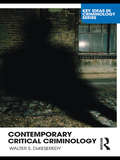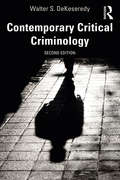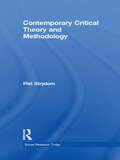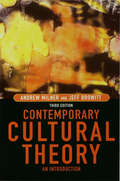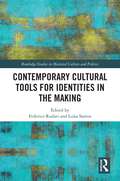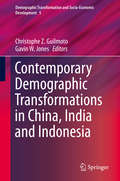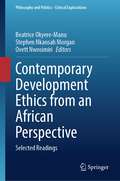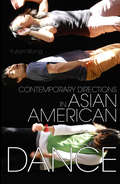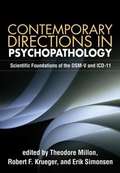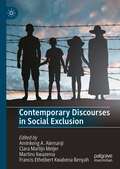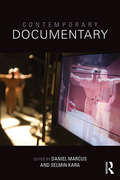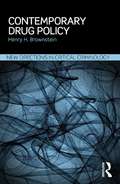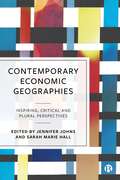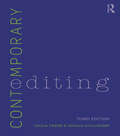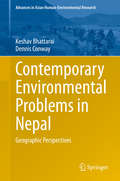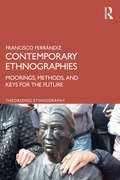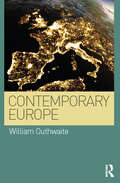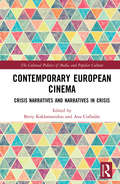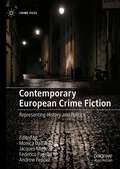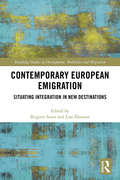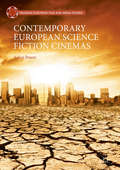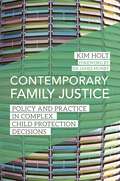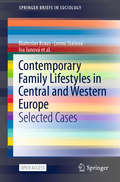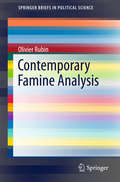- Table View
- List View
Contemporary Critical Criminology
by Walter S. DeKeseredyThe concept of critical criminology – that crime and the present day processes of criminalization are rooted in the core structures of society – is of more relevance today than it has been at any other time. Written by an internationally renowned scholar, Contemporary Critical Criminology introduces the most up-to-date empirical, theoretical, and political contributions made by critical criminologists around the world. In its exploration of this material, the book also challenges the erroneous but widely held notion that the critical criminological project is restricted to mechanically applying theories to substantive topics, or to simple calling for radical political, economic, cultural, and social transformations. This book is an essential source of reference for both undergraduate and postgraduate students of Criminology, Criminal Theory, Social Policy, Research Methodology, and Penology.
Contemporary Critical Criminology
by Walter S. DeKeseredyThe concept of critical criminology – that crime and the present-day processes of criminalization are rooted in the core structures of society – is of more relevance today than it has been at any other time. Written by an internationally renowned scholar, Contemporary Critical Criminology introduces the most up-to-date empirical, theoretical, and political contributions made by critical criminologists around the world. In its exploration of this material, the book also challenges the erroneous but widely held notion that the critical criminological project is restricted to mechanically applying theories to substantive topics, or to simply calling for radical political, economic, cultural, and social transformations. Now fully updated and expanded in a new edition, this book offers further coverage of new directions in critical criminology, covering topics such as: Green criminology Indigenous criminology Intersectionality Narrative criminology Rural critical criminology Queer criminology Zemiology Critical research methods Contemporary critical criminological policies Written in a clear and direct style, this book is an essential source of reference for both undergraduate and postgraduate students of criminology, deviance and social control, criminological theory, social policy, research methodology, and criminal justice.
Contemporary Critical Theory and Methodology (Social Research Today)
by Piet StrydomContemporary critical theory’s methodology is currently taking shape under the impact both of transformative internal develops within the discipline, and of external pressures and incentives arising from a series of international debates. In this book, Piet Strydom presents a groundbreaking treatment of critical theory’s methodology, using as a base the reconstruction of the left-Hegelian tradition, the relation between critical theory and pragmatism, and the associated metatheoretical implications. He assesses extant positions, presents a detailed yet comprehensive restatement and development of critical theory’s methodology, compares it with a wide range of current concepts of social criticism and critique, and analyzes leading critical theorists’ exemplary applications of it. Besides immanent transcendence and the sign-mediated epistemology common to the left-Hegelian tradition, special attention is given to the abductive imagination, reconstruction, normative and causal explanation, explanatory mechanisms and the communicative framework which enables critical theory to link up with its addressees and the public. Contemporary Critical Theory and Methodology is recommended reading for senior undergraduate and postgraduate students, as well as professionals working within disciplines such as sociology, philosophy, political science, critical theory and cultural studies.
Contemporary Cultural Theory: An Introduction
by Andrew Milner Jeff BrowittFirst Published in 2002. Routledge is an imprint of Taylor & Francis, an informa company.
Contemporary Cultural Tools for Identities in the Making (Routledge Studies in Material Culture and Politics)
by Luísa Santos Federico RudariContemporary Cultural Tools for Identities in the Making asks how cultural and artistic practices constitute a central tool for the expression and recognition of individual and collective identities, and how shared creative efforts shape alternative lexical and symbolic languages. Gathering both theoretical discussion and praxis, chapters explore the strong potential of artistic and cultural action and production in the delineation and expression, but also questioning, of identities and the definition of new ones in the making. From literature and documentary to architecture and visual arts, the transmedial analysis centres the expression of stories that demonstrate how creative practices are significant tools to cross domains of belonging and breaking traditional boundaries.This comprehensive and interdisciplinary volume will appeal to a broad audience of postgraduate students, researchers, and scholars in cultural studies, media and visual arts, creative and cultural industries, queer studies, postcolonial and migration studies, literary studies, architecture, and sociology.
Contemporary Cultures 1600 to the present (South Carolina)
by Mcgraw-Hill EducationSocial Studies Textbook for Grade 7 in South Carolina
Contemporary Demographic Transformations in China, India and Indonesia (Demographic Transformation and Socio-Economic Development #5)
by Christophe Z. Guilmoto Gavin W. JonesThis book examines the profound demographic transformation affecting China, India, and Indonesia, where 40% of the world's people live. It offers a systematic, comparative approach that will help readers to better understand the changing social and regional recomposition of the population in these regions. The chapters present a detailed investigation and mapping of regional trends in mortality, fertility, migration and urbanization, education, and aging. Throughout, the analysis carefully considers how these trends affect economic and social development. Coverage also raises global, theoretical questions about the singular ways in which each of these three countries have achieved their demographic transition. As the authors reveal, demographic trends seem to be somewhat linear and anticipatable, providing Asia's three demographic giants and their governments a formidable advantage in planning for the future. But the evolution of human mobility in China, India, and Indonesia, closely intertwined as it is with changing economic conditions, appears less predictable and ranks high among the major challenges to demographic knowledge in the coming decades. Offering an insightful look into the components, implications, and regional variations of a changing population, this book will appeal to social scientists, demographers, anthropologists, sociologists, epidemiologists, and specialists in Asian studies.
Contemporary Development Ethics from an African Perspective: Selected Readings (Philosophy and Politics - Critical Explorations #27)
by Beatrice Okyere-Manu Stephen Nkansah Morgan Ovett NwosimiriThis book offers fresh academic insights, reflections, questions, issues, and approaches to development ethics, taking into account, African values and ethics. Development ethics is an area of applied ethics that examines the moral issues involved in global, social, and economic transformation. While it is a relatively new discipline, there have been numerous scholarly publications on it from Western perspectives. However, only a few studies that focused on development ethics from the African perspective. To address this gap, the book seeks to answer critical questions such as "What does development mean to Africans?", "How can we measure development?", "Who gets to decide?", and "What constitutes just development in Africa?" With contributions from African scholars from diverse backgrounds, the book covers various development themes such as Theories and approaches to development ethics in Africa, Environmental Ethics and African Development, Ethics, Politics and African Development, Migration and African development, Gender, Ethics and Socio-economic Development in Africa, Education, Ethics and African development. It is an essential resource for researchers, lecturers, and students interested in political philosophy and African culture studies.
Contemporary Directions in Asian American Dance (Studies in Dance History)
by Yutian WongThe definition of Asian American dance is as contested as the definition of "Asian American." The contributors to this volume address such topics as the role of the 1960s Asian American movement in creating Japanese American taiko groups, and the experience of internment during World War II influencing butoh dance in Canada. Essays about artists such as Jay Hirabayashi, Alvin Tolentino, Shen Wei, Kun-Yang Lin, Yasuko Yokoshi, Eiko & Koma, Sam Kim, Roko Kawai, and Denise Uyehara look closely at the politics of how Asian aesthetics are set into motion and marketed. The volume includes first-person narratives, interviews, ethnography, cultural studies, performance studies, and comparative ethnic studies.
Contemporary Directions in Psychopathology
by Robert Krueger Theodore MillonThis forward-thinking volume grapples with critical questions surrounding the mechanisms underlying mental disorders and the systems used for classifying them. Edited and written by leading international authorities, many of whom are actively involved with the development of DSM-V and ICD-11, the book integrates biological and psychosocial perspectives. It provides balanced analyses of such issues as the role of social context and culture in psychopathology and the pros and cons of categorical versus dimensional approaches to diagnosis. Cutting-edge diagnostic instruments and research methods are reviewed. Throughout, contributors highlight the implications of current theoretical and empirical advances for understanding real-world clinical problems and developing more effective treatments.
Contemporary Discourses in Social Exclusion
by Aminkeng A. Alemanji Clara Marlijn Meijer Martins Kwazema Francis Ethelbert Kwabena BenyahThis book looks into different forms of social exclusion in different societies or contexts. It is important to note that in some cases, social exclusion is fueled by the deprivation of economic resources, political and social rights. In contrast, social constructs or cultural norms constitute significant factors in other cases. At the subject (macro) level, this book opens up an avenue where researchers from different subjects can look into how central issues of their subject can be understood through the lenses of social exclusion. For example, historical perspectives of social exclusion, sociological perspectives of social exclusion, religiosity and social exclusion, gender perspectives of social exclusion, educational perspectives of social exclusion, etc. At the thematic (micro) level, this book looks into how specific themes like racism, the corona virus pandemic, albinism, media, sexuality and gender intersect with social exclusion. In doing all these, the book also provides a much-needed multidisciplinary and methodological understanding of issues of social exclusion.
Contemporary Documentary
by Daniel Marcus Selmin KaraContemporary Documentary offers a rich survey of the rapidly expanding landscape of documentary film, television, video, and new media. The collection of original essays addresses the emerging forms, popular genres, and innovative approaches of the digital era. The anthology highlights geographically and thematically diverse examples of documentaries that have expanded the scope and impact of non-fiction cinema and captured the attention of global audiences over the past three decades. It also explores the experience of documentary today, with its changing dynamics of production, collaboration, distribution, and exhibition, and its renewed political and cultural relevance. The twelve chapters - featuring engaging case studies and written from a wide range of perspectives including film theory, social theory, ethics, new media, and experience design - invite students to think critically about documentary as a vibrant field, unrestricted in its imagination and quick in its response to new forms of filmmaking. Offering a methodical exploration of the expansive reach of documentary as a creative force in the media and society of the twenty-first century, Contemporary Documentary is an ideal collection for students of film, media, and communication who are studying documentary film.
Contemporary Drug Policy (New Directions in Critical Criminology)
by Henry H BrownsteinThis book focuses on the use of drugs in our lives and how we respond to them. Whereas drug policy typically centres on the problems of illicit drugs or licit drugs used in illicit ways or circumstances, Contemporary Drug Policy instead considers the wide variety of substances we call drugs as a normal part of our personal and social experience and asks how and when drugs benefit us as well as how and when they are harmful. The evidence is clear that at some times, in some circumstances, and in some places drugs are a problem. This book does not ignore these issues but shifts our attention to making policies that also recognize their legitimate and constructive place in society. It focuses on asking questions, challenging assumptions, and developing responses to drugs based on evidence from scientific study as directed by critical criminological theory rather than mainstream theory or unfounded assumptions. Different from other books on drug policy, this book does not offer answers or solutions. Rather it shows how critical criminological theories can lead scientific research in new directions supportive of policies that offer both solutions to problems that are found to be related to drugs and an appreciation for the benefits that drugs can bring to people and society. This book will be of interest to those studying or researching drug policy as well as professionals involved in policy making processes.
Contemporary Economic Geographies: Inspiring, Critical and Plural Perspectives
by Jennifer Johns and Sarah Marie HallThe subdiscipline of economic geography has a long and varied history, and recent work has pushed the field to diversify even further. This collection takes this agenda forward by showcasing inspiring, critical and plural perspectives for contemporary economic geographies. Highlighting the contributions of global scholars, the thirty chapters showcase fresh ways of approaching economic geography in research, teaching and praxis. With sections on thought leaders, contemporary critical debates and future research agendas, this collection calls for greater openness and inclusivity.
Contemporary Editing
by Cecilia Friend Don ChallengerContemporary Editing offers journalism students a forward-looking introduction to news editing, providing instruction on traditional newsroom conventions along with a focus on emerging news platforms. This comprehensive text provides students with a strong understanding of everything an editor does, addressing essential copy editing fundamentals such as grammar and style; editorial decision making; photo editing, information graphics, and page design; and new media approaches to storytelling. Throughout, the book focuses on how "the editor’s attitude"—a keen awareness of news values, ethics, and audience—comes into play in all facets of news editing. This new edition offers expanded coverage of web publishing and mobile media, giving students solid editing skills for today’s evolving media and news forums. Features of the Third Edition: -Editing 2.0 boxes discuss the impact of digital technology and social media on editing. -Coverage of grammar problems and a new chapter on working with numbers provide students with a strong grasp of math and grammar, which are the underpinnings for all writing and editing. -An emphasis on editing for brevity prepares students to write and edit clearly and briefly, for print and for the web. -A chapter on the art of headline writing guides students through one of the editor’s most important tasks, and introduces the task of search engine optimization. -Examples of ethics and legal situations show students how issues arise in even the most basic stories, and how to address them. -Online exercises present additional practice for students, without needing to purchase a workbook. ? ?
Contemporary Environmental Problems in Nepal: Geographic Perspectives (Advances in Asian Human-Environmental Research)
by Dennis Conway Keshav BhattaraiThis monograph examines contemporary environmental challenges facing Nepal, this landlocked country’s representativeness in the wider South Asian context is both distinct and generalizable. In large part, this is because of its extremes of physiographical structure- plains, hill ranges, mountainous massifs - and wide range of altitudinal terrains, which represent and replicate South Asian and East Asian continental conditions differing as markedly as humid tropical lowlands, sub-tropical hill ranges and temperate to sub-arctic mountainous environments. Associated forest regimes, in which deforestation and reforestation patterns have evolved in recent times, and differing densities of settlement and cleared agricultural landscapes in each of these altitudinal zones, add to the environmental diversity of Nepal. Associated fauna and exotic species are in various states of endangerment especially Bengal tigers, one horned rhinos, wild elephants, crocodile, musk deer, and peasants, to name a few- so that their forested and mountainous habitats as ‘Wild Life Reserves’ also deserve our attention, and are featured in this monograph’s remit.
Contemporary Ethnographies: Moorings, Methods, and Keys for the Future (Theorizing Ethnography)
by Francisco FerrándizContemporary Ethnographies is a call to use ethnography in imaginative ways, adjusting to rapidly evolving social circumstances. It is based on a reflexive and theoretically grounded exploration of the author’s two main research projects – the study of the spiritist possession cult of María Lionza in Venezuela, and the analysis of the contemporary exhumation of Civil War (1936–1939) mass graves in contemporary Spain. Ferrándiz critically reviews the labyrinthine and continuous transforming nature of ethnographic engagement. He defends both the need for methodological rigour and the astounding flexibility of ethnography to adjust in creative ways to shifting realities in a dynamic world – a world in which research scenarios multiply, social actors are on the move (physically or digitally), acts of violence proliferate, new technologies are transforming the experience and perception of human life, and the demand, production, circulation and consumption of knowledge is greatly diversified, overshadowing former well established and more hierarchical patterns of diffusion. The book is conceived of as a historically grounded open debate, providing as many certainties as moments of unpredictability and unresolved dilemmas. It is valuable reading for students and scholars interested in ethnographic methods and anthropological theory.
Contemporary Europe (Critical Theory And Contemporary Society Ser.)
by William OuthwaiteEurope is one of the most dynamic and interesting areas of the world, pioneering in the European Union a new form of governance for half a billion people, represented in the world’s first directly elected transnational parliament. This book situates the European Union in a broader European, global, historical and geographical context, providing a readable presentation of the most important facts and drawing on the theoretical approaches which have transformed the study of contemporary Europe over the past two decades. The European Union is still on the road to what has been called 'an unknown destination', and this book presents its economic, political, legal and social trajectory from the middle of the last century to the present. Contemporary Europe covers some of these issues in an interdisciplinary framework, aiming to situate the development of the European Union in a broader context of pan-European and global processes. Europe has been cut down to size, but it does not have to become a global backwater, and the study of contemporary Europe’s institutional reality does not have to be boring The book counter this misperception, conveying the essential facts and theories of contemporary European reality in a clear and approachable analysis. It will serve as a readable introduction both to the academic field of European studies and to contemporary Europe itself.
Contemporary European Cinema: Crisis Narratives and Narratives in Crisis (The Cultural Politics of Media and Popular Culture)
by Betty Kaklamanidou Ana M. CorbalánThis book offers a range of accounts of the state of "European Cinema" in a specific sociopolitical era: that of the global economic crisis that began in 2008 and the more recent refugee and humanitarian crisis. With the recession having become a popular theme of economic, demographic, and sociological research in recent years, this volume examines representations of the crisis and its attendant market instability and mistrust of neoliberal political systems in film. It thus sheds light on the mediation, reimagination, and reformulation of recent history in the depiction of personal, cultural, and political memories, and raises new questions about crisis narratives in European film, asking whether the theoretical notion of "national" cinema is less or more powerful during moments of sociopolitical turbulence, and investigating the kinds of cultural representations and themes that characterize the narratives of European documentary and fictional films from both small and large national markets.
Contemporary European Crime Fiction: Representing History and Politics (Crime Files)
by Andrew Pepper Federico Pagello Monica Dall’Asta Jacques MigozziThis book represents the first extended consideration of contemporary crime fiction as a European phenomenon. Understanding crime fiction in its broadest sense, as a transmedia practice, and offering unique insights into this practice in specific European countries and as a genuinely transcontinental endeavour, this book argues that the distinctiveness of the form can be found in its related historical and political inquiries. It asks how the genre’s excavation of Europe’s history of violence and protest in the twentieth century is informed by contemporary political questions. It also considers how the genre’s progressive reimagining of new identities forged at the crossroads of ethnicity, gender, and sexuality is offset by its bleaker assessment of the corrosive effects of entrenched social inequalities, political corruption, and state violence. The result is a rich, vibrant collection that shows how crime fiction can help us better understand the complex relationship between Europe’s past, present, and future. Seven chapters are available open access under a Creative Commons Attribution 4.0 International License via link.springer.com.
Contemporary European Emigration: Situating Integration in New Destinations (Routledge Studies in Development, Mobilities and Migration)
by Lisa Åkesson Brigitte SuterAt a time when European unity is politically challenged by the question of immigration and integration, it is easy to overlook the fact that there are significant numbers of Europeans leaving the continent. Academically, little is known about why Europeans leave the continent, how they chose their destination, and how they experience their migrant life. Drawing on the lived experiences of contemporary European emigrants from a range of different countries, this book sheds light on how global economic, political and social transformations spur new forms of migration and mobility experiences. Contemporary European Emigration explores how Europeans experience economic, cultural or social integration, and the power relations which play out between them and their hosts. By delving through the lenses of national and racial identity, gender, age, and profession, this book provides enticing insights into how Europeans see themselves in the world. By shifting our focus to migrants leaving Europe and observing the emerging challenges to European superiority as they play out in the microlevel of people’s everyday lives, this book provides a nuanced understanding of contemporary migration. Researchers within Migration Studies and European Studies will find this book an important addition to the literature.
Contemporary European Science Fiction Cinemas (Palgrave European Film and Media Studies)
by Aidan PowerContemporary European Science Fiction Cinemas charts the evolution of European science fiction cinema in the 21st century, a period in which Europe itself has faced myriad crises. Key to this study is an exploration of how European science fiction responds to prevalent issues such as the financial crisis, political extremism and violence, large-scale migration and indeed the potential breakup of the European Union itself. What futures does science fiction cinema envision for Europe? Is it capable of moving beyond dystopian visions of a continent beset by seemingly omnipresent turbulence? Emphasising science fiction’s unique ability to estrange, exploit and reflect upon popular concerns, this book directly engages with such questions, accounting for ongoing mutations in the very nature of the European project as it does so.
Contemporary Family Justice: Policy and Practice in Complex Child Protection Decisions
by Sir James Munby Kim HoltDemonstrating how the law and statutory guidance applies in practice, this book is a critical account of current family justice policy and practice. It draws on recent legislation, case law and research findings to provide clear, accessible information and advice on how to make the difficult decisions in pre-proceedings child care practice work. With reference to child protection legislation and practice frameworks, this book highlights the importance of undertaking informed and effective assessments based on the best outcome for the child. The book acknowledges the constraints facing practitioners, such as working under considerable pressure within tight time frames and focuses on the issues which commonly present as challenges for practice, such as neglect, child sexual exploitation and pre-birth assessments. This is essential reading for students and practitioners in social work and law, as well as policy-makers and other professionals concerned with the current state of child welfare.
Contemporary Family Lifestyles in Central and Western Europe: Selected Cases (SpringerBriefs in Sociology)
by Blahoslav Kraus Leona Stašová Iva JunováThis open access book brings together a unique set of comparative data from Western and Central Europe on how contemporary families live, and discusses the similarities and differences in family lifestyles in this region. The empirical data comes from the authors‘ original research derived from adult representatives of families with children in the Czech Republic, Germany, Latvia, Poland, Slovakia and Ukraine. The authors compare and interpret information on the social and economic situation of families, expressed satisfaction in their lifestyles, and leisure and media in the everyday life of families. Overall, the authors bring into the discussion both current knowledge and original empirical data on families and contribute to literature on the sociology of the family, particularly in Europe. This book is useful to researchers and students interested in family issues, along with professionals in the field of family care and social policy.
Contemporary Famine Analysis (SpringerBriefs in Political Science)
by Olivier RubinThis Brief provides some answers as to why famines continue to torment humankind here in the 21st century despite all our progress in food production, logistics, information dissemination and relief work. Contemporary famines are inherently political, and so the interesting question is not how famines can be prevented, but why they are allowed to develop in the first place; only by understanding the latter, is there hope to eradicate major famines. The Brief assesses the various analytical approaches to the understanding of famine, from the classical approaches inspired by Thomas Malthus to the newer economic approaches based on Amartya Sen. While all approaches contribute with important insights on famine dynamics, they also struggle to capture the political dimension of contemporary famines. The Brief develops a political approach capable of addressing this important but messy political dimension of contemporary famines. The approach builds on principles of humanitarian accountability (the moral responsibility to alleviate suffering from famine) as well as political accountability (the interests and power relations involved in famine outcomes).
